Uganda through 57 years
For the first time, Uganda wins two gold medals at the IAAF championships held in Doha, Qatar, via Halima Nakaayi (800 metres) and Joshua Cheptegei (10,000 metres).
INDEPENDENCE COUPS WAR PEACE
09.10.62 - Uganda became independent from Britain, celebrated her first independence
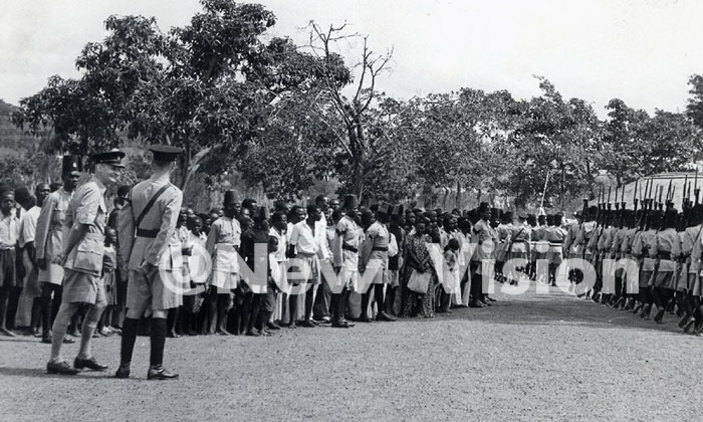
25.10.62 - Uganda became a member of the United Nations Security Council
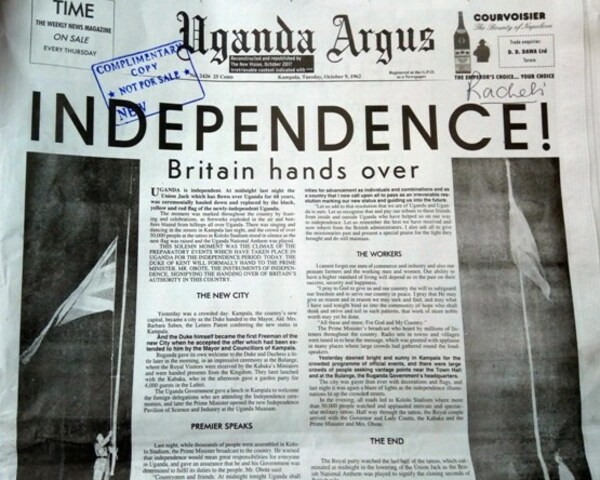
25.05.63 - The Organisation of African Unity (OAU) was formed in Addis Ababa with Uganda as one of the founder members
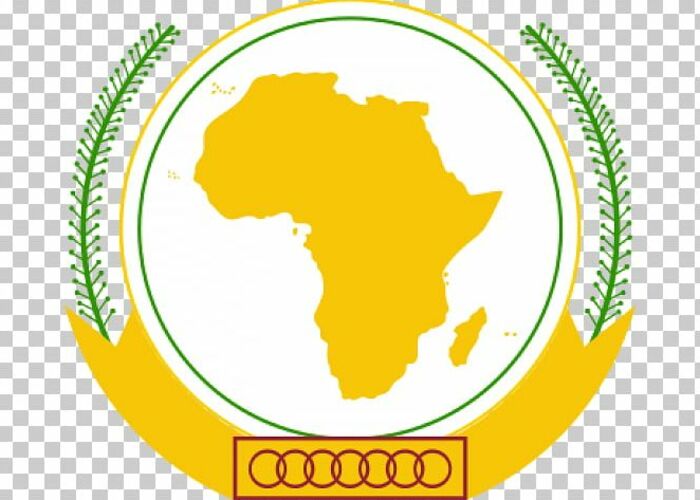
17.06.63 - Uganda's first five-year economic development plan is announced
04.10.63 - The National Assembly elected Edward Mutesa as President
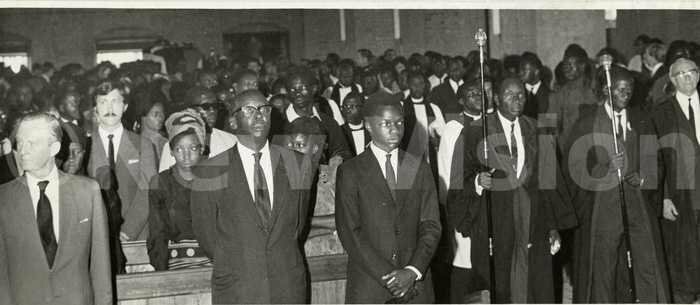
Mutesa after being elected president
08.10.63 - Uganda Television began television transmission to the Nation
01.04.64 - The General Service Unit is created as Uganda's first intelligence agency
24.08.64 - Milton Obote announced the end of the UPC-KY alliance
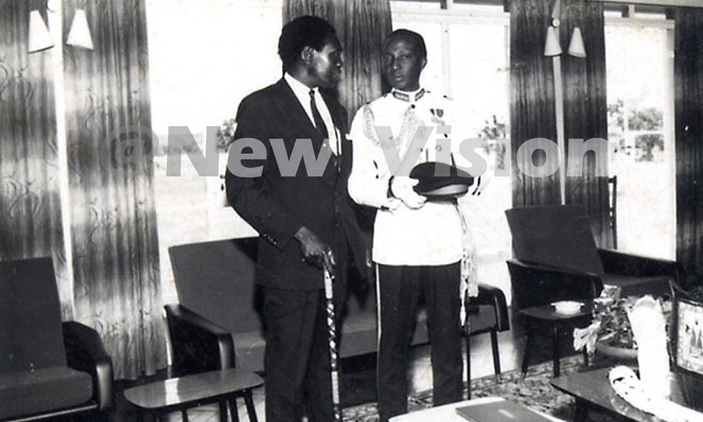
Obote and Mutesa
31.10.64 - During this week, a 10,000-pound sterling radioisotope lab was established at Makerere University for nuclear energy research
01.01.65 - The two lost Counties, Buyaga, and Bugangaizi, were transferred to Bunyoro following a November 1964 referendum over there status
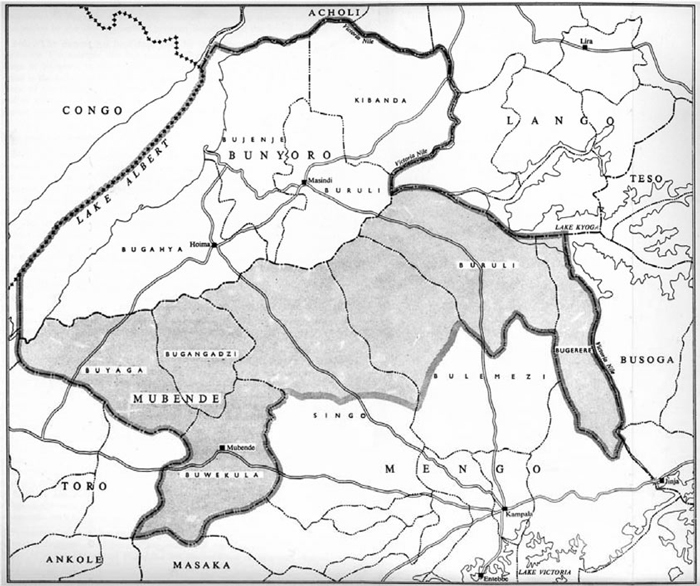
Map of the lost counties
07.02.65 - 22 Uganda Martyrs were canonized at a solemn pontifical high mass at Nakivubo Stadium in Kampala
24.02.66 - Milton Obote announced the suspension of the 1962 constitution
04.03.66 - Prime Minister Milton Obote announced that he had taken over the full executive powers formerly held by President Edward Mutesa
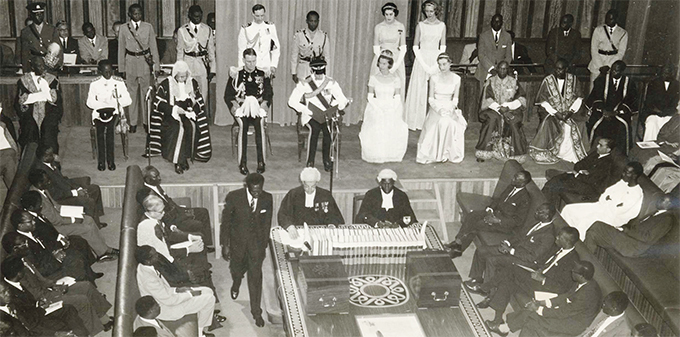
Parliament in session in the 1960s
15.04.66 - A new interim constitution was introduced and passed in parliament
17.09.67 - Kingdoms were abolished and Uganda became a republic
18.07.69 - Pope Paul VI visits Uganda
19.10.69 - Political Parties banned
13.02.71 - Amin became President and Commander-in-Chief
09.05.72 - Nagulu Public Safety Unit set up
May 1972 - Uganda Muslim Supreme Council created
22.03.74 - Official announcement for creating 10 provinces and 38 districts
November 1977 - Action Program for Rehabilitation and Development 1977/78 - 1979/80 was launched
December 1977 - New Foreign Investment Decree (Decree 18 of 1977) came into existence guaranteeing tax holidays and repatriation of profits
March 1978 - Amin sets up the Human Rights Commission to advise him and explain Uganda's image abroad
25.03.79 - Uganda National Liberation Front (UNLF) is formed. National Consultative Council (NCC) is created. The Uganda National Liberation Army is proclaimed
16.07.80 - The Military Commission announced that Uganda citizens of Asian and European origin, whose property was seized by Amin's regime, were free to return and reclaim it;
Uganda National Examinations Board (UNEB) was set up to administer and supervise all future national primary and secondary school examinations.
10.12.80 - Voting begins in the first general elections in Uganda since 1962
15.12.80 - The President-elect Milton Obote is sworn-in; DP forms the new opposition in Parliament
23.08.82 - Under the direction of the International Monetary Fund, a dual foreign currency exchange system, "Window One" and "Window Two" was introduced by the Bank of Uganda;
Window one was for official government transactions while Window Two was open on a weekly basis to the private sector. However, it abandoned in 1984 due to constant underfunding.
13.02.83 - The United Nations Secretary-General, Javier Perez de Cuellar, on a two-day visit to Uganda, expresses satisfaction with the recovery process in the country and says the United Nations will continue to extend development aid to Uganda
21.02.83 - The Expropriated Properties Act of 1982 comes into effect; the act covers property seized from the expelled Asians in 1972
04.03.83 - The Ministry of Internal Affairs, in a press statement, announces that the government has beaten back the guerillas in several of the areas of there operations in the country
06.01.84 - Uganda, Kenya, and Tanzania reach an agreement on the division of assets and liabilities of the defunct East African Community
17.12.85 - The military government of Uganda led by General Tito Okello and Yoweri Museveni's rebel National Resistance Movement agree on peace terms and sign an accord in the Kenyan capital Nairobi
26.01.86 - The National Resistance Army rebel group overruns Kampala after a heavy battle with government troops
29.01.86 - Guerilla leader Yoweri Museveni is sworn-in as President
1986: Aug, In Uganda the Holy Spirit Mobile Forces (HSMF), a Christian fundamentalist revolt, began under the leadership of Alice Lakwena (1956-2007). The movement was crushed by the army and Lakwena fled to Kenya where she was imprisoned in 1987.
11.12.86 - The Uganda Human Rights Commission to investigate atrocities and other violations since 1962 is created
15.05.87 - The government announces a major restructuring of the economy, designed by the International Monetary Fund; it includes currency conversion and devaluation, and a rise in interest rates
18.05.87 - A new currency, with a 30 percent tax charge, is introduced into circulation
30.12.87 - Rebel leader Alice Lakwena is arrested in Kenya for illegal entry into the country
24.10.88 - A constitutional bill establishing a Constitutional Commission is passed by the country's Parliament, the National Resistance Council, to spend the next four years gathering opinions on a proposed constitution from all over the country
1989: Jan 12, Idi Amin was expelled from Zaire (later CongoDRC) and forced to return to Saudi Arabia.
10.02.89 - Elections to seats in an expanded National Assembly, the National Resistance Council, are held in the country; queuing up in a single file behind the preferred candidate rather than the ballot box, is the method used
1990: Joseph Kony, a faith healer, revived the Holy Spirit Movement and led his LRA rebels in northern Uganda from training camps in southern Sudan.
19.02.90 - The Spanish gov't announces a 40 million dollar loan to Uganda for the rehabilitation of Entebbe Airport, the development of central storage, construction of cold stores, and for rolling stock to the Uganda Railways Corporation
29.03.90 - The Coffee Marketing Board announces the export of 174,000 tonnes of coffee in 1989, the highest figure since 1975
25.02.1991 - Uganda hosts the Joint ACP/EEC Assembly in Kampala
29.04.1991 - As a reflection of changing perceptions about the country, a special advertising section focusing on Uganda's economic and political reconstruction is published in the international edition of Newsweek magazine
29.02.1992 - Nation-wide elections for officials at the lower local to district level councils are held
07.04.1992 - Radio Uganda reports that the Army Council had decided at a meeting in Gulu on April 03 to begin negotiations over the return of cultural sites to the kingdoms of Ankole, Buganda, Bunyoro, Busoga and Toro
21.04.1992 - Uganda and China sign an agreement on the construction of a new Chinese funded National Stadium at Namboole outside Kampala
04.07.1992 - The government launches a $93.6 million reconstruction program for northern Uganda sponsored by the World Bank, donor countries and aid agencies, aimed mainly at the repair of roads and extension of electricity
05.2.1993 - Pope John Paul II arrives in Uganda on a five-day visit
14.07.1993 - The National Resistance Council passes the Constitution Amendment Bill, 1993, which cancels the 1967 abolition of traditional kingdoms
31.07.1993 - Ronald Muwenda Mutebi II is enthroned as the 36th king of Buganda kingdom
16.08.1993 - The AIDS Control Program announces that one out of every eight Ugandans is infected with the HIV virus that causes AIDS; the government requests foreign donors for $550 million to fund a five-year plan to slow the spread of the epidemic
17.08.1993 - Several major coffee-exporting countries including Uganda, in a meeting in Kampala, agree to create a new cartel, the Association of Coffee Producing Countries, that would raise coffee prices on the world market by reducing supply
05.11.1993 - A treaty establishing the Common Market for Eastern and Southern Africa (COMESA) is reached in Kampala between Uganda, Ethiopia, Kenya, Sudan, Eritrea, Tanzania, Mozambique, and Zambia
18.12.1993 - The first radio station in Uganda, Radio Sanyu FM music station opens in Kampala
17.03.1994 - Representatives of the Sudanese government and the rebel Southern Sudanese Liberation Movement (SPLM) meet indirect talks in Nairobi aimed at ending the 11-year civil war in southern Sudan; the foreign ministers of Kenya, Uganda, Ethiopia and Eritrea act as mediators
28.03.1994 - Nationwide elections are held to select delegates to the Constitution Assembly which will debate Uganda's new constitution
04.04.1994 - The 7th Pan African Congress convenes in Kampala
11.06.1994 - Solomon Gafabusa Iguru I is enthroned as the 27th king of Bunyoro-Kitara kingdom
28.03.1995 - After a crucial and much-publicized debate, the Constituent Assembly delegates vote to reject a proposed amendment to Article 201 of the draft constitution that would create a federal system of government in Uganda based on regions
26.08.1995 - Death of the king of Toro, Patrick David Matthew Kaboyo Olimi II in Fort Portal; he is succeeded as king by his infant son, Oyo Nyimba Kabamba Iguru Rukiidi IV
22.09.1995 - The new Constitution is enacted by the Constituent Assembly
11.02.1996 - Henry Waako Muloki is enthroned as king of Busoga kingdom
09.05.1996 - Yoweri Kaguta Museveni wins Uganda's first direct presidential elections since Independence.
27.06.1996 - Elections for members of a new Parliament are held
1996: July 14, more than 90 Sudanese refugees were killed in a camp 220 miles north of Kampala. The Lord's Resistance Army was blamed.
1996: October, The LRA abducted 139 girls from a Catholic school run by Italian nuns. One nun managed to plead for the release of 109 girls but the rebels kept 30, ignoring pleas from Pope John Paul II and other world leaders.
01.04.1997 - A report by the AIDS Control Program of the Ministry of Health for March reveals that the rate of HIV/AIDS infection had decreased from 20.2% in 1995 to 15.1% in 1996
23.04.1997 - In a new formula designed to reduce the debt burden of heavily indebted countries, the international institutions, the World Bank and IMF announce an offer to waive 19% of Uganda's foreign debt, making Uganda the first country to benefit from the new measures first proposed in 1996
June 1998: Newly elected Kampala mayor Nasser Ntege Sebaggala was arrested in New York for lying to custom's agents, bringing in $108,000 in traveler's checks without declaring them and defrauding the Boston Bank. He was convicted in 1999 and sentenced to 15 months in prison.
1998: Sep 18, Uganda's government closed the International Credit Bank due to activities ‘detrimental to the interests of depositors.
1999: Feb 14, two bombs exploded in Kampala bars and 5 people were killed and 35 injured.
1999: Mar 1, Hutu rebels kidnapped 13 tourists and an unknown number of Ugandans at the Bwindi National Park. Linda Adams of Alamo, Ca. escaped the rebels by faking an asthma attack. Separately rebels of the Allied Democratic Forces killed 5 people in a camp near Ntotoro village.
1999: Mar 2, Hutu rebels killed 8 hostages and 4 Ugandans. Among the dead were Americans Robert Haubner and Susan Miller of Hillsboro, Ore. They were there to track the mountain gorillas. Uganda insisted that the 2 Americans, 4 Britons and 2 New Zealanders died in a police rescue bid.
1999: Mar 3, The Ugandan army killed 15 of the Rwanda Hutu rebels who butchered 8 foreign tourists Mar 2. Another 100 rebels escaped into the bush inside the Republic of the Congo.
2000: Mar 17, Some 330 followers of the Movement for the Restoration of Ten Commandments of God, led by Joseph Kibweteree, burned to death in a mass suicide in Kanungu. Children were involved and it was not clear if Kibweteree was killed. More bodies were found at the house of Kibweteree. Foul play was later suspected instead of suicide. 448 other victims were later found.
2000: Apr 6, Authorities issued 6 arrest warrants for the prominent figures of the doomsday sect: Joseph Kibwetere, Credonia Mwerinde, Dominic Kataribabo, Joseph Kasapurari, John Kamagara, and Ursula Komuhangi. All were charged with 10 counts of murder, representing the first 10 identified victims of 924 corpses.
2000: May 5, In Congo Ugandan and Rwandan troops clashed at Kisangani and at least 10 civilians were killed and 100 wounded.
2000: Oct 14, It was reported that at least 35 people of the northern Gulu district had died in recent weeks of a hemorrhagic fever possibly caused by the Ebola or Marburg virus.
2000: Oct 22, Death from the Ebola fever climbed to 54 as health officials continued a village by village search for people with contact with the virus.
2000: Nov 12, Uganda confirmed a new case of Ebola in Masindi, the 3rd district to confirm the deadly virus.
2000: Dec 5, Dr. Matthew Lukwiya, who diagnosed the Ebola outbreak 2 months earlier, died from the disease.
2000: Dec 8, The victims with Ebola reached 400 including 160 dead.
2000 - Ugandans vote to reject multi-party politics in favour of continuing Museveni's "no-party" system.
2001: Jan 15, In East Africa the presidents of Kenya, Tanzania, and Uganda formed a regional partnership, reviving one that collapsed in 1978.
2001: Mar 12, Elections were held. President Museveni (56) was challenged by Kiiza Besigye (44), a retired army colonel. Museveni won with 69.3% to Besigye's 27.8%.
2001: Mar 27, Rebels ambushed students of Jimmy Ssekasi Institute of Catering on a field trip to Murchison Falls and killed 11 people, including the proprietor.
2001: Aug 17, Col. Kiiza Besigye left Uganda and claimed that his life was threatened for criticism of Pres. Museveni.
2001 January - East African Community (EAC) inaugurated in Arusha, Tanzania, laying the groundwork for common East African passport, flag, economic and monetary integration. Members are Tanzania, Uganda, and Kenya.
2001 March - Museveni wins another term in office, beating his rival Kizza Besigye by 69% to 28%.
2002 March - Sudan, Uganda sign agreement aimed at containing Ugandan rebel group the Lord's Resistance Army (LRA), active along the common border.
2002 December - Peace deal signed with Uganda National Rescue Front (UNRF) rebels after more than five years of negotiations.
2002: Mar, Ugandan forces in "Operation Iron Fist" pursued the Lord's Resistance Army (LRA) into southern Sudan, where the rebels killed at least 470 villagers.
2002: Aug, Uganda agreed to withdraw it's troops from neighboring Congo, where they were sent four years ago to support Congolese rebels and root out Ugandan insurgents. Ugandan troops withdrew from Congo.
2003: Mar 2, In northern Uganda rebels of the Lord's Resistance Army fighting a 16-year war called a cease-fire and asked to meet Pres. Yoweri Museveni.
2003: Apr 23, In northern Uganda rebels waging a 16-year insurgency attacked two villages and abducted more than 180 people.
2003: Jul 11, Pres. Bush met with Pres. Yoweri Museveni in Uganda. Bush and his wife Laura praised Uganda's aggressive prevention and treatment programs to combat HIV.
2003: Aug 16, Former Ugandan dictator Idi Amin, blamed for the murder of tens of thousands of his people in the 1970s, died in a Saudi hospital where he had been critically ill for weeks. In 2006 the film "The Last King of Scotland," was adapted from a novel by Giles Foden that focused on Idi Amin. The film, directed by Kevin McDonald, featured Forest Whitaker as Amin.
2003: Nov 8, Rebels in northern Uganda killed more than 100 civilians in raids over the last five days. The Lord's Resistance Army raided villages in Lira district.
2004: Feb 21, In northern Uganda LRA rebels, attacked a refugee camp, torching homes and gunning people down as they fled. At least 192 people were killed, some perishing in the flames of there own homes.
2004: Feb 25, In northern Uganda, massive street protests after a massacre by rebels turned violent, with mobs beating rival tribesmen and burning houses and police shooting into the crowd. At least nine people were killed.
2004: Mar 18, In northwestern Uganda unidentified gunmen raided and looted a college and killed two American missionaries and a Ugandan student.
2004: Mar 20, Uganda government troops backed by helicopter gunships fought fierce battles with rebels in northern Uganda, killing more than 50 insurgents.
2004: May 16, In Uganda rebels killed 22 civilians during a raid on a Gulu district camp set up for refugees.
2004: May 20, In Uganda rebels raided the northern village of Gulu, hacking and burning to death at least 25 people, including eight children.
2004: Jun 25-27, Ugandan rebels (LRA) in southern Sudan unleashed a two-day campaign of arson, looting, and murder, killing 100 villagers and forcing 15,000 others to flee there homes.
2004: Jul 24, It was reported that rebels fighting an 18-year insurgency in northern Uganda have killed at least 42 civilians in southern Sudan in the past week.
2004: Jul 28, The Ugandan army reportedly killed 120 rebel Lord's Resistance Army (LRA) fighters during clashes in southern Sudan and narrowly missed capturing Joseph Kony, the insurgents' leader.
2005: Oct 10, Apolo Milton Obote (b.1924), former head of Uganda, died in South Africa. He led Uganda from 1966-1971, when he was overthrown in a coup by Idi Amin, and from 1980-1985 following disputed general elections.
2005: Oct, Uganda opposition leader Kiiza Besigye, Pres. Museveni's former doctor, returned from exile to contest the presidency.
November 14, 2005: Opposition leader Kiiza Besigye was arrested and charged with treason, which carries the death penalty, concealment of treason and rape. His supporters rioted and clashed with security forces for two days, leaving at least one man dead.
August 2005: Dorcas Inzikuru wins Uganda's first international gold medal in 33 years by creating the world record in 300m steeplechase women. Parliament removes the presidential two-term limit. Kizza Besigye returns from exile South Africa in readiness to stand in Uganda's first multiparty elections since 1980.
July 2005 - Parliament approves a constitutional amendment which scraps presidential term limits. Voters in a referendum overwhelmingly back a return to multi-party politics.
2005 October - International Criminal Court issues arrest warrants for five LRA commanders, including leader Joseph Kony.
2006 February - President Museveni wins multi-party elections, taking 59% of the vote against the 37% share of his rival, Kizza Besigye. EU observers highlight the intimidation of Besigye and official media bias as problems.
2006: Feb 25, Uganda's election commission declared that President Yoweri Museveni (62) overwhelmingly won re-election in the first multiparty elections in 25 years.
2006: Oct 21, Uganda's president traveled to southern Sudan to bolster faltering talks between his government and rebels aimed at ending a brutal 19-year conflict in northern Uganda.
2006: Nov 6, Canada's Heritage Oil reported an oil find on the Ugandan side of Lake Albert.
2006: Nov 12, Jan Egeland, the UN's top humanitarian official, helicoptered to a jungle clearing to meet with Joseph Kony, a Ugandan rebel leader accused of war crimes, but he failed to secure freedom for women and children held captive by the insurgent group. Kony denied that his forces are holding prisoners.
2007: Jan 12, Ugandan rebels pulled out of peace talks with the government, dealing a blow to already faltering negotiations aimed at ending one of Africa's most brutal conflicts.
2007: Jan 17, Alice Lakwena, a Ugandan warrior priestess who led an insurgency in the 1980s, died at a Kenyan refugee camp. She was known as Alice Auma and claimed to have been possessed by a spirit.
2007: Feb 17, The film "The Last King of Scotland," adapted from a novel by Giles Foden, had it's official premiere in Kampala, Uganda. The film, starring Forest Whitaker and directed by Kevin McDonald, featured Whitaker as former dictator Idi Amin.
April 12, 2007: In Uganda protesters stoned to death two people of Asian origin during a demonstration against a Ugandan-Indian company that wants to grow sugar cane in the country's largest natural forest, Mabira Forest. Two others were also killed in the rioting.
April 14, 2007: Uganda's government and a rebel group responsible for one of Africa's longest and most brutal wars signed a new truce and agreed to resume stalled peace talks later this month. Joseph Kony, the elusive leader of the rebel Lord's Resistance Army, witnessed the signing in Ri-Kwangba, Sudan.
August 16, 2007: Uganda announced plans to send 250 extra soldiers to a peacekeeping mission in Mogadishu, but Somalia's government warned they were not enough and urged other African nations to commit troops.
November 23, 2007: CHOGM presidents and prime ministers from Britain and it's former colonies discussed democracy, human rights and the rule of law at the start of a Commonwealth summit. They were presented with the new report: "Civil Paths to Peace: Report of the Commonwealth Commission on Respect and Understanding," while police and anti-government protesters clashed nearby.
March 2007 - Ugandan peacekeepers deploy in Somalia as part of an African Union mission to help stabilise the country.
April 15, 2008: In Uganda a fire tore through a primary school dormitory overnight, killing 19 girls and two adults. Police said that the blaze may have been deliberately set.
May 16, 2008: London-based Tullow Oil Plc announced the discovery of oil reserves in western Uganda, boosting hopes for the energy-starved east African nation
December 14, 2008: Uganda, southern Sudan, and Congo launched an offensive against the Lord's Resistance Army bases based in eastern Congo in an attempt to end one of the continent's longest and most brutal wars.
March 15, 2009: Uganda began withdrawing troops hunting brutal Lord's Resistance Army rebels in neighboring Congo. Felix Kulaigye, the military spokesman, said the operation had been a success, with around 100 rebels killed and more than 200 abductees rescued, and that Congo would continue the hunt.
September 11, 2009: Buganda riots, 3 people including a child were shot dead in rioting in Kampala. Clashes began on Sep 10 after the government prevented a representative of the traditional ruler of the Buganda kingdom from traveling to a region northeast of the capital for a political rally. The overall death toll from the unrest rose to at least 24 following deaths in hospitals.
October 19, 2009: In Uganda President Museveni officially recognized the 300,000 strong Rwenzururu Kingdom under Charles Wesley Mumbere (56), who had inherited the title in 1966 at age 13. Museveni restored all the traditional kingdoms banned in 1967.
December 2009 - Parliament votes to ban female circumcision. Anyone convicted of the practice will face 10 years in jail or a life sentence if a victim dies.
July 11, 2010 - Al Shabaab terrorists bomb Kampala and kill 80 people who were watching World Cup finals.
February 2011 - Museveni wins his fourth presidential election. Challenger Kizza Besigye alleges vote-rigging and dismisses the result as a sham.
August 12, 2012 - Kiprotich wins Olympic gold. Stephen Kiprotich stunned a strong Kenyan team to win the men's Olympic marathon in London, handing Uganda only there second-ever Olympic gold medal after John Akii-Bua won the 400m hurdles in the 1972 Games in Munich.
May 2012 - Ugandan Army captures senior LRA commander Caesar Achellam in a clash in the Central African Republic, one of the nearby states in which the remaining band of LRA troops operates.
October 09, 2012 - Ugandans celebrated it's golden Jubilee independence
August 2013 - Kiprotich wins gold in Moscow. Stephen Kiprotich rose to the occasion to win the men's marathon in Moscow
December 2013 - Parliament passes a controversial anti-gay bill that increases the punishment for homosexual acts to include life imprisonment.
February 2014 - President Museveni signs the tough new anti-gay bill into law, drawing criticism from around the world.
June 12, 2015 - Pope Francis' confirmed that he would be visiting the Central African Republic and Uganda (and possibly Kenya) in November 2015
November 27, 2015 - Uganda hosts Pope Francis. Pope Francis arrived in Uganda at Entebbe International Airport aboard Shepherd One, and welcomed by President Museveni, flanked by the First Lady Janet Museveni, Ministers, Religious Leaders and officials. This was the Third time was hosting a Pope.
January 2015 - Dominic Ongwen becomes the first member of the Lord's Resistance Army to appear before the International Criminal Court.
February 2016 - President Museveni wins re-election against veteran candidate Kizza Besigye, amid opposition, Commonwealth, US, and European Union concern about fairness and transparency.
February 2017 - Four countries launch an intelligence centre in Uganda from which they will coordinate the fight against the rebel Allied Democratic Forces.
April 2017 - Uganda withdraws it's forces from the Central African Republic where it has been fighting the Lord's Resistance Army for the past five years.
March 17, 2017 - Assassination of police spokesman Assistant Inspector General of Police Andrew Felix Kaweesi stuns the nation. Constitution amended to remove lower and upper age limits for presidency.
June 15, 2018 - Entebbe expressway commissioned. President Yoweri Museveni together with the chairperson of the Chinese People's Political Consultative Conference (CPPCC), Wang Yang presided over the commissioning of the Kampala- Entebbe expressway in Mpala, Entebbe. The Entebbe expressway is Uganda's first highway. It is arguably the most beautiful piece of Uganda's growing stock of infrastructure.
October 17, 2018 - President Museveni commissions Source of the Nile Bridge. The New Source of the Nile Bridge is been described as a thing of beauty - an architectural masterpiece as any you would find anywhere in the world. The 525m long cable-stayed bridge is the second of it's kind in East Africa after Tanzania's 680m-long Kigamboni Bridge. And in Africa, the Source of Nile Bridge is the fifth longest cable-stayed bridge behind Egypt's Suez Canal Bridge (3,900), Lekki Ikoyi Bridge in Nigeria (1,360m), Mohammed VI Bridge in Morocco (950m) and Tanzania's Kigamboni.
March 21, 2019 - Museveni commissions the Isimba Dam. President Yoweri Museveni commissioned the 183MW Isimba Hydropower Station, located at Nampanyi village in Kayunga district. The 183MW Isimba Hydropower project is 4km downstream of Isimba Falls on the River Nile and about 50km downstream from the source of the Nile. The project site is about 21km from Kayunga, the nearest town and about 65km from Jinja town.
October 06, 2019: For the first time, Uganda wins two gold medals at the IAAF championships held in Doha, Qatar, via Halima Nakaayi (800 metres) and Joshua Cheptegei (10,000 metres).